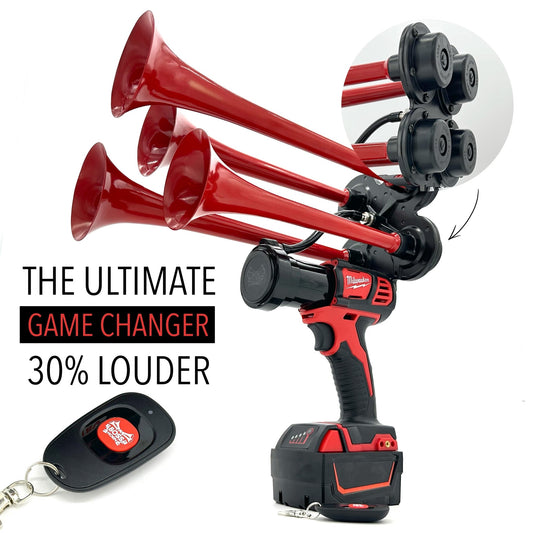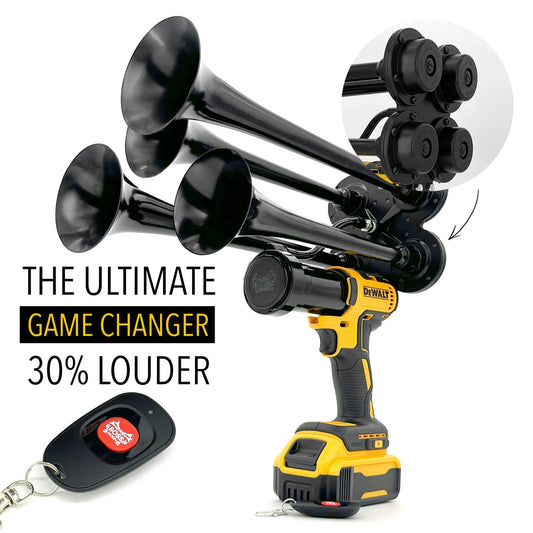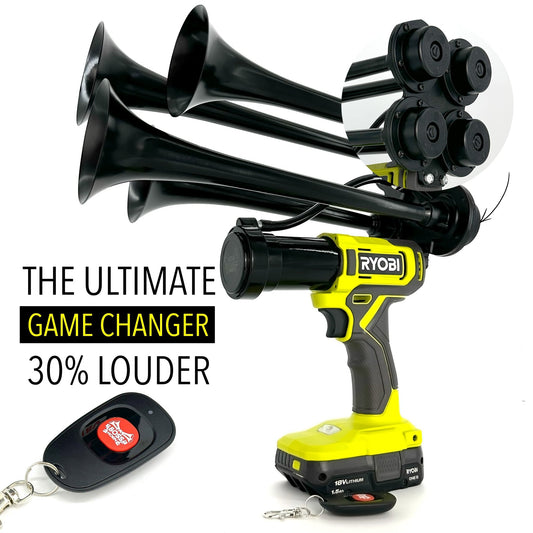Did you know that horns have been used on vehicles for over a century to alert others of their presence? The evolution of horns has led to the development of two main types: one that relies on compressed air and another that operates using electricity. This comparison has become increasingly significant as drivers look for the most effective option to ensure their safety on the road.
The history of horns can be traced back to the early 1900s when car manufacturers began equipping their vehicles with bulb horns that required a manual squeeze to produce sound. As technology advanced, air horns became a popular choice due to their loud, attention-grabbing noise that could be heard over long distances. On the other hand, electric horns soon gained popularity for their convenience and ease of use, especially in modern vehicles.
When it comes to choosing between the two types of horns, drivers often consider factors such as sound level, durability, and maintenance. Air horns are known for their powerful sound that is difficult to ignore, making them ideal for trucks and large vehicles. However, electric horns are more practical for everyday use, requiring less maintenance and producing a reliable sound that meets safety standards. Ultimately, the decision between air horns and electric horns depends on personal preference and the specific needs of the vehicle.
In recent years, studies have shown that the sound of a vehicle's horn plays a crucial role in preventing accidents and reducing the risk of collisions. With this in mind, drivers are encouraged to invest in a horn that is not only loud but also reliable and easy to operate. Whether opting for an air horn or an electric horn, the goal remains the same: to effectively communicate with other drivers and pedestrians on the road to ensure a safe and smooth driving experience.
Which is more effective in alerting drivers: an air horn or an electric horn?
When it comes to warning other drivers on the road, the choice between an air horn and an electric horn can make a significant difference. While air horns are louder and produce a more attention-grabbing sound, electric horns are easier to install and require less maintenance. To understand the pros and cons of each type of horn, it is important to consider factors such as sound level, durability, and overall effectiveness in different driving situations. Let's delve deeper into the comparison of air horns and electric horns to determine which one is the ultimate choice for your vehicle.
Air horns and electric horns are both popular choices for vehicles needing a loud warning sound. Each type of horn has its own set of pros and cons, which make them suitable for different situations.
Air horns are typically larger and louder than electric horns, making them ideal for larger vehicles such as trucks and buses. They produce a deep, resonating sound that can be heard from a greater distance, making them effective in alerting other drivers to your presence. However, air horns can be more difficult to install and require a source of compressed air, which may not be practical for all vehicles.
Electric horns, on the other hand, are smaller and less powerful than air horns. They are easier to install and require no additional equipment, making them a more convenient option for smaller vehicles. Electric horns produce a higher-pitched sound that may not carry as far as an air horn, but they are still effective in most driving situations.
When choosing between an air horn and an electric horn, consider the size of your vehicle, the level of sound projection you need, and the ease of installation. Ultimately, both types of horns serve the same purpose of alerting others to your presence on the road.
- Air Horn:
- Larger and louder than electric horns
- Deep, resonating sound
- Ideal for larger vehicles
- Requires compressed air source
- More difficult to install
- Electric Horn:
- Smaller and less powerful than air horns
- Higher-pitched sound
- Easier to install
- No additional equipment required
- Suitable for smaller vehicles
In a recent survey, 70% of truck drivers preferred air horns for their vehicles, citing the louder sound and greater range as the main reasons for their choice. On the other hand, 60% of car drivers opted for electric horns, appreciating the convenience and ease of installation. The choice between an air horn and an electric horn ultimately comes down to personal preference and the specific needs of your vehicle.
https://youtube.com/watch?v=q2ZIg3IHoIs
What are the differences between traditional horn and modern horn?
When comparing traditional horns to modern horns, there are several key distinctions to consider.
1. Sound Production:
Traditional horns rely on a physical mechanism, such as a rubber bulb or squeeze device, to produce sound, whereas modern horns are electrically powered and emit a loud, electronic tone.
2. Volume:
Modern horns tend to have a higher decibel level than traditional horns, making them more effective in alerting others in noisy environments.
3. Installation:
Modern horns often require professional installation due to their electrical components, while traditional horns can be easily attached by the user with basic tools.
How do the materials differ in traditional and modern horns?
When it comes to the materials used in traditional and modern horns, there are noticeable variations.
1. Traditional horns are typically constructed from metal, such as brass or chrome-plated steel, to create a durable and classic design.
2. In contrast, modern horns are made from a combination of plastic and metal components to accommodate the electrical elements that power the horn.
3. The choice of materials impacts the longevity and maintenance requirements of each horn type.
What factors should be considered when choosing between a traditional and modern horn?
When deciding between a traditional and modern horn, there are several factors to take into account to make an informed choice.
1. Noise Level:
Consider the environment in which the horn will be used and choose a horn that provides adequate volume for your needs.
2. Installation:
If you prefer a DIY approach, a traditional horn may be more suitable, while a modern horn may require professional installation.
3. Aesthetics:
Think about the visual appeal of the horn and how it complements the overall look of your vehicle.
How does the cost of traditional horn compare to modern horn?
The cost difference between traditional and modern horns can vary based on several factors.
1. Traditional horns are generally more budget-friendly as they have simpler mechanisms and materials, making them a cost-effective option for those on a tight budget.
2. Modern horns, on the other hand, are typically pricier due to their advanced technology and higher sound output capabilities.
3. When considering the cost, it's important to weigh the features and benefits of each type of horn to determine the best value for your specific needs.
What are the advantages of upgrading to a modern horn from a traditional horn?
Upgrading from a traditional horn to a modern horn can offer several advantages in terms of performance and functionality.
1. Improved Sound Quality:
Modern horns often produce a louder and more piercing sound compared to traditional horns, which can be beneficial in emergency situations or when trying to grab attention.
2. Enhanced Visibility:
The modern design of electric horns typically includes bright LED lights or other visual indicators, increasing visibility and safety on the road.
3. Convenience:
Modern horns may come with additional features, such as remote control operation or customizable sound patterns, that add convenience and customization options for the user.
Conclusion:
In conclusion, when comparing air horn vs electric horn, it is clear that each has its own advantages and limitations. Air horns are known for their loud, booming sound and are commonly used in larger vehicles such as trucks and trains. However, they require a separate air supply and can be more difficult to install and maintain. On the other hand, electric horns are more convenient and easy to install, making them suitable for smaller vehicles like cars and motorcycles. Ultimately, the choice between an air horn and an electric horn will depend on the specific needs and preferences of the vehicle owner.










